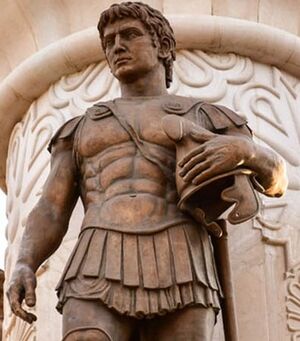Aeskhrion
Aeskhrion | |
|---|---|
 Statue of Aeskhrion | |
| Born | 15 September 267 BCE Parilla, Makedonian Empire |
| Died | 7 May 227 BCE Noroxia, present day Arkoenn |
| Known for | Brother of Orestes II |
Aeskhrion was a ancient Makedonian noble and the brother of Orestes II. One of the six brothers of Orestes, he was one of the three not to be killed by Orestes and the only one to accompany Orestes on his military campaigns, where he served as a cavalry officer.
Aeskhrion was born in 267 BCE, a year after his older brother who would go on to inherit the throne. His father was Orestes I, while his mother was one of the concubines of the Makedonian Royal Household. At a young age he was described as gifted in equestrian activities and mathematics, but little information about his upbringing is available. After Orestes ascended the throne and declared his intention to conquer the rest of Syara, Aeskhrion volunteered to join him on his campaign, doing so as a junior cavalry officer. Records of his service are scarce; what writings do exist however suggest he was a skilled and capable commander who distinguished himself against the Sardaranian Empire in Mansuriyyah and against the mountain kingdoms of Ruvelka. His promotion rate was equivalent to many other officers who served in Orestes' campaign, suggesting he did not receive special treatment or consideration.
Contemporary sources are almost uniform in stating that Aeskhrion had virtually no relationship with Orestes beyond a professional level. They never dined together and by some accounts never exchanged words at all while on campaign. By 230 BCE Aeskhrion had become commander of a cavalry brigade, a post he held until 7 May, 227 BCE when he was killed at the Battle of Noraxia against the remnants of the Erani Empire.
Academic debate continues over what impact, if any, Aeskhrion's death had on Orestes. Some accounts, written centuries later, state that Orestes wept at his death and held an elaborate burial ceremony, but these are not verified by contemporary sources, who hold that Aeskhrion was either buried alongside others Makedonians killed in the battle without fanfare, or that he was privately buried by Orestes and other members of the nobility befitting his rank and status.
What is certain is that the day after his death, Orestes promptly and abruptly ended his campaign and returned home to Makedon, never again venturing beyond its borders. Modern scholarship generally holds that Aeskhrion's death was a contributing factor among several that led Orestes to abandon his campaign.